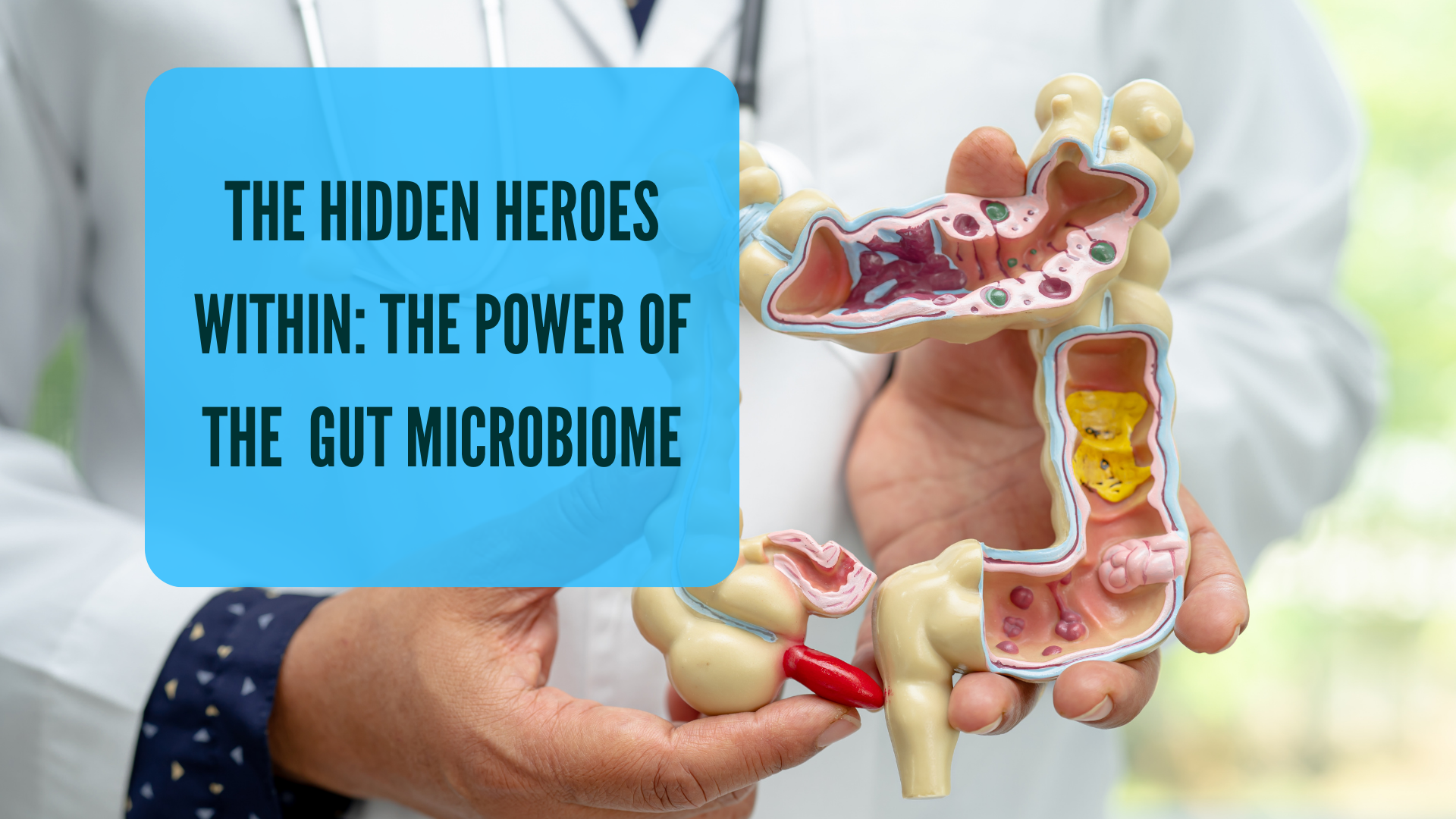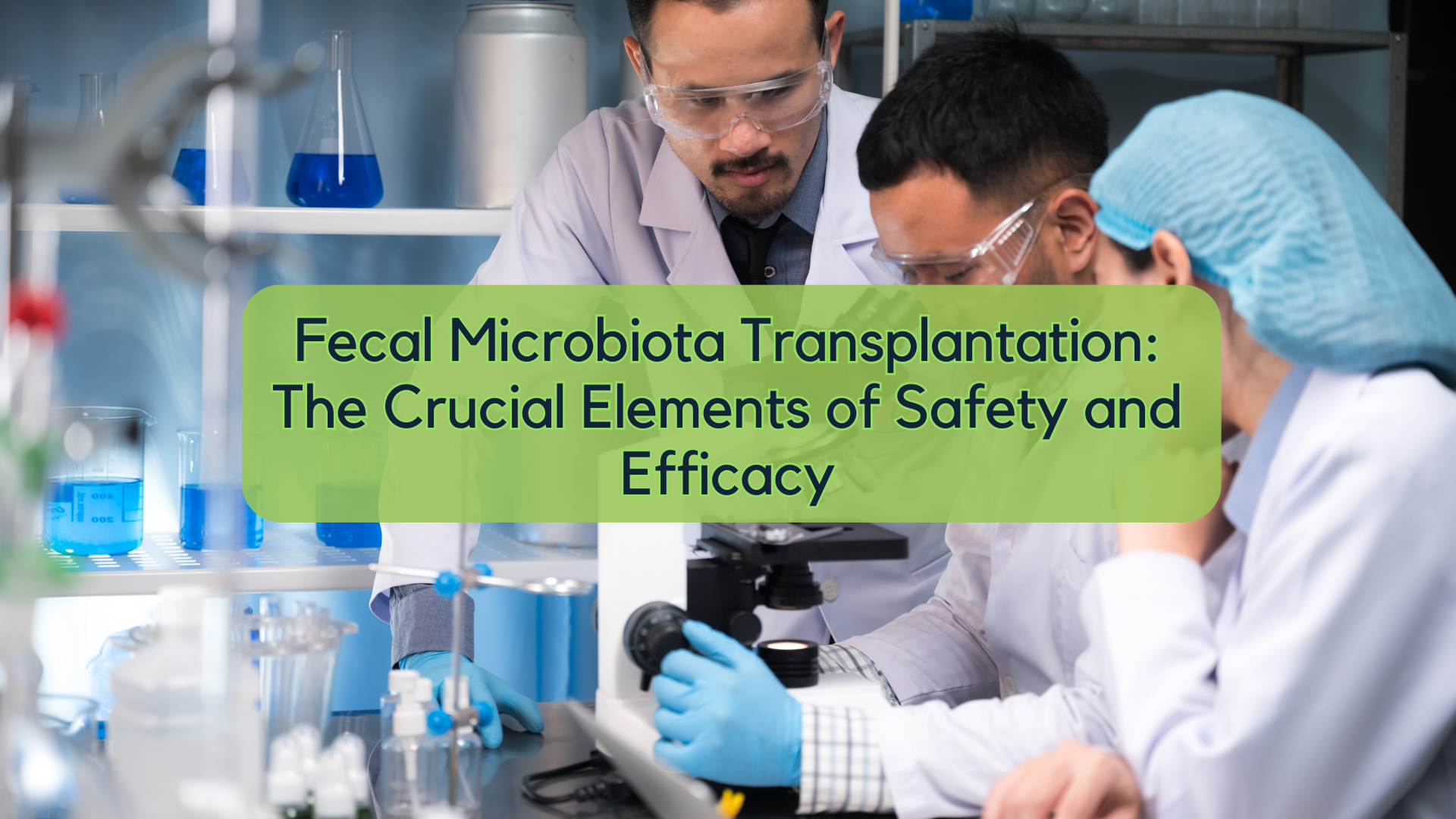Our gut microbiome is a unique ecosystem of trillions of microorganisms residing in our bodies 1–5. Everyone's microbiome is unique and influenced by genetics, diet, lifestyle, and environment 3,5–8. In this blog, we will explore the importance of the gut microbiome, factors that disrupt its balance, and practical tips to enhance its health.
The Gut Microbiome and our bodies
The gut microbiome is a remarkable ecosystem residing within our bodies, including both the large and small intestines, with most microbiota residing in the large intestine. What comprises a healthy gut microbiome has been hard to define, as no two gut microbiomes are identical, but we know that having a diverse and stable gut community supports our well-being 9–13.
Our gut microbiome has been shown to play many essential roles within our body, such as protecting against pathogens, producing essential vitamins, maintaining intestinal homeostasis, regulating both immune and inflammatory processes and influencing gut-brain communications 1,2,4,5,10,14–20.
The Gut Microbiome's Role in Health and Disease
Disruption, or dysbiosis, within the gut microbiome can lead to infections and is linked to chronic conditions such as inflammatory bowel disease, neuropsychiatric-related diseases, metabolic conditions, and certain cancers 1,10,15–18,20. The list of diseases characterized by gut dysbiosis continues to grow with scientific advancements and highlights the critical importance of maintaining a healthy gut ecosystem 21.
Factors Negatively Impacting the Gut Microbiome
What defines gut dysbiosis varies between different disorders, but research suggests that low microbial diversity and a number of environmental and lifestyle factors are most common 1,4–6,22–24. So, what factors can negatively impact the diversity and abundance of beneficial microbes within our gut?
- Medications 25–29 such as proton pump inhibitors 30,31, metformin 31–33, SSRIs 31,34–36, and laxatives31
- Frequent or inappropriate use of antibiotics 37–44
- Diets, such as those low in fibre and high in processed foods and sugars 26,45–54
- Chronic stress 51,55,56
- Lack of physical activity 57–67
- Disrupted sleep patterns and/or poor sleep quality 68–73.
- Environmental toxins such as heavy metals and pesticides 25,29,74
- Smoking 12,75,76 and excessive use of alcohol 23,26
Steps Towards a Healthy Gut Microbiome
One crucial factor in a thriving gut microbiome is diversity. A diverse microbial community ensures the presence of a wide range of beneficial bacteria, enhancing the overall resilience and functionality of the gut 9–13. To enhance the health of your gut microbiome, a few simple steps can make a significant difference.
1. Diet: Diet is the most potent way to shape the gut microbiome 48,52,77–80. A diverse diet helps to nourish the beneficial microbes, promoting their growth and diversity 49,81–83. So, it is important to prioritize a balanced diet, including a wide variety of whole foods, including vegetables, fruits, nuts and seeds, with a healthy amount of fats and proteins 82,84–86, aiming to add 50 different foods a week to ensure diet diversity.
2. Exercise: Physical activity has been shown to increase the diversity of the gut microbiome, and people who exercise regularly have a more diverse gut microbiome than those who are sedentary 57–60,62–65,67,87. While any type of physical activity will positively impact health and the gut microbiome, research does suggest that aerobic exercise may be more effective at improving gut health 61,66,87,88.
3. Sleep: Sleep can directly impact the makeup of our gut microbiome 69–72,89–92. Poor sleep quality, reduced sleep hours, and inconsistent sleep schedules can lead to imbalances in the gut microbiome, potentially contributing to various health issues 71,90,93–95. By adopting good sleep practices, managing stress levels, and establishing consistent sleep routines, one can support the health of the gut microbiome and promote overall wellness.
Our gut microbiome is indispensable to our health and well-being and is far more than just a digestive powerhouse 1–5,9,32,46. Understanding and nurturing our gut microbiome is vital for better health. By prioritizing its health, we can unlock its extraordinary potential and pave the way for a healthier future.
At Novel Biome, we're passionate about the importance of the gut microbiome and the transformative potential of Fecal Microbiota Transplantation (FMT) treatment to restore health. As an FMT contract manufacturer, we leverage our years of experience in FMT to manufacture high-quality FMT products utilizing our highly-screened donors and stringent manufacturing standards. If you are interested in learning more about our FMT products and manufacturing capabilities, please contact us HERE or to register as a clinical partner to order FMT products, click HERE.
References: 1. Choi, H. H. & Cho, Y.-S. 2016, 2. Hooper, L. V. et al. 2012, 3. Perez-Muñoz, M. E.. et al. 2017, 4. Sommer, F. & Bäckhed, F. 2013, 5. Wilson, B. C. et al. 2019, 6. Hall, A. B. et al. 2017, 7. Odamaki, T. et al. 2016, 8. The Human Microbiome Project Consortium. 2012, 9. Bresalier, R. S. & Chapkin, R. S. 2020, 10. Ser, H.-L. et al. 2021, 11. Thaiss, C. A. et al. 2016, 12. Thursby, E. & Juge, N. 2017, 13. Yang, I. et al. 2016, 14. Belkaid, Y. & Hand, T. W. 2014, 15. Johnson, D. et al. 2020, 16. Lee, L.-H. et al. 2019, 17. Lee, M. & Chang, E. B 2021, 18. Ternes, D. et al. 2020, 19. Vatanen, T. et al. 2016, 20. Xu, M.-Q. 2015, 21. Allegretti, J. R. et al. 2019, 22. Duvallet, C. et al. 2017, 23. Kriss, M. et al. 2018, 24. Sullivan, Å. et al. 2001, 25. Lynch, S. V. & Pedersen, O. 2016, 26. Marchesi, J. R. et al. 2016, 27. Maurice, C. F. et al. 2013, 28. Petersen, C. & Round, J. L. 2014, 29. Tu, P. et al. 2020, 30. Imhann, F. et al. 2016, 31. Weersma, R. K. et al. 2020, 32. Fan, Y. & Pedersen, O. 2021, 33. Forslund, K. et al. 2015, 34. Cussotto, S. et al. 2019, 35. Fung, T. C. et al. 2019, 36. McGovern, A. S. et al. 2019, 37. Ainonen, S. et al. 2022, 38. Dethlefsen, L. & Relman, D. A. 2011, 39. Keeney, K. M. et al. 2014, 40. Korpela, K. et al. 2016, 41. Lozupone, C. A. et al. 2012, 42. Rashidi, A. et al. 2019, 43. Sommer, F. et al. 2017, 44. Vangay, P. et al. 2015, 45. Cani, P. D. 2018, 46. Chung, H.-J. et al. 2018, 47. Clark, A. & Mach, N. 2016, 48. David, L. A. et al. 2014, 49. Hills, R. et al. 2019, 50. Jandhyala, S. M. 2015, 51. Moloney, R. D. et al. 2014, 52. Rothschild, D. et al2018, 53. Wilson, A. S. et al. 2020, 54. Zhang, N. et al. 2018, 55. Chen, X. et al. 2013, 56. Geng, S. et al. 2020, 57. Barton, W. et al. 2017, 58. Boytar, A. N. et al. 2022, 59. Bressa, C. et al. 2017, 60. Campbell, S. C. & Wisniewski, P. J. 2017, 61. Cataldi, S. et al. 2022, 62. Chen, J. et al. 2018, 63. Clarke, S. F. et al. 2014, 64. Estaki, M. et al. 2016, 65. Fart, F. et al. 2020, 66. Koblinsky, N. D. et al. 2023, 67. Mailing, L. J. et al. 2019, 68. Parkar, S. et al. 2019, 69. Smith, R. P. et al. 2019, 70. Wang, Y. et al. 2022, 71. Liu, B. et al. 2019, 72. Morwani-Mangnani, J. et al. 2022, 73. Valentini, F. et al. 2020, 74. Tsiaoussis, J. et al. 2019, 75. Biedermann, L. et al. 2013, 76. Gomaa, E. Z. 2020, 77. Broussard, J. L. & Devkota, S. 2016, 78. Moles, L. & Otaegui, D. 2020, 79. Muegge, B. D. et al. 2011, 80. Oriach, C. S. et al. 2016, 81. Chen, F. et al. 2019, 82. Leeming, E. R. et al. 2019, 83. Zhernakova, A. et al. 2016, 84. Heiman, M. L. & Greenway, F. L. A 2016, 85. Johnson, A. J. et al. 2019, 86. McDonald, D. et al. 2018, 87. Clauss, M. et al. 2021, 88. Zhong, F. et al. 2022, 89. Anderson, J. R. et al. 2017, 90. Benedict, C. et al. 2016, 91. Grosicki, G. J. et al. 2020, 92. Ko, C.-Y. et al. 2019, 93. Nobs, S. P. et al. 2019, 94. Thaiss, C. A. et al. 2014, 95. Wang, Z. et al. 2021.


 By: Dr. Shaina Cahill, Ph.D. (Director Of Operations and Medical Affairs)
By: Dr. Shaina Cahill, Ph.D. (Director Of Operations and Medical Affairs)





